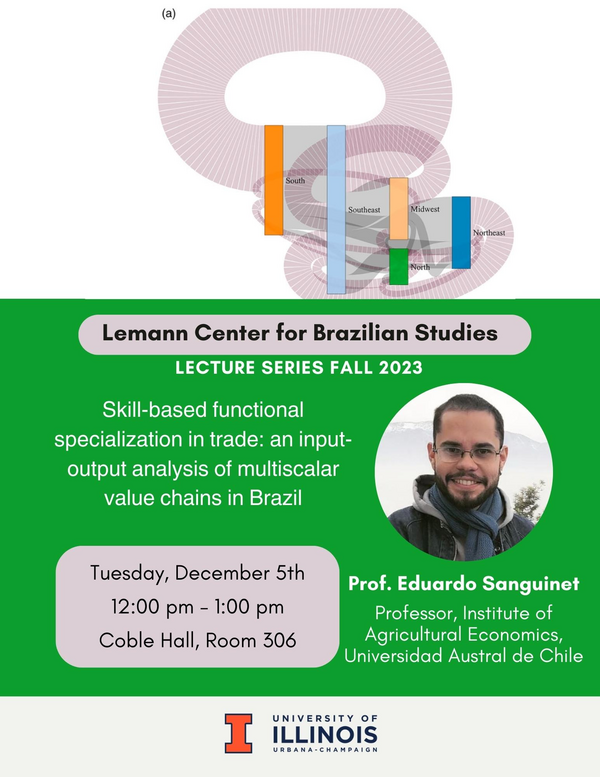
Lemann Lecture Series | Eduardo Sanguinet | Skill-based functional specialization in trade: an input–output analysis of multiscalar value chains in Brazil
- Event Type
- Lecture
- Sponsor
- The Lemann Center for Brazilian Studies
- Location
- Coble Hall 306
- Date
- Dec 5, 2023 12:00 - 1:00 pm
- Speaker
- Eduardo Sanguinet
- Contact
- Lemann Center
- lemann@illinois.edu
- Views
- 157
- Originating Calendar
- Lemann Center Events
Sophisticated spatial labour markets can promote better opportunities for functional upgrading in value-added trade. This paper estimates the skill-based functional specialization in Brazilian labor factor content in trade in value-added (LTiVA), considering different geographical scales. We combined an interregional input–output model for Brazilian states with occupational data to identify the skill intensity embedded in LTiVA based on the hypothetical extraction method (HEM) technique. Our findings show that the largest Southeastern economic area specializes in highly sophisticated functions, while the rest of the country embodies low skills in value-added trade for domestic and global trade levels. Furthermore, the results reveal a central role for the São Paulo state in governing the subnational value chains and reinforcing the international uneven spatial functional division pattern at the subnational level.
Eduardo Sanguinet
Ph.D. in Development Economics from the Pontifical Catholic University of Rio Grande do Sul (PUCRS, Brazil) and Ph.D. in Applied Economics with a focus on Regional Studies from Universidad Católica del Norte (UCN, Chile) under a joint supervision agreement with dual degree recognition. He holds a Master's degree in Rural Development from the Federal University of Rio Grande do Sul (UFRGS, Brazil) and a Bachelor's degree in Economics from the Federal University of Santa Maria (UFSM, Brazil). He completed doctoral and post-doctoral internships in Economics at the Center for Regional and Urban Economics at the Faculty of Economics and Administration of the University of São Paulo (NEREUS - FEA-USP), funded by the National Council for Scientific and Technological Development (CNPq). Has expertise in research and extension projects in the areas of regional economics, rural and environmental economics, and agrarian policies. Researches topics related to interregional and international trade, trade policies, and value chains using multi-sector models.He is a Professor at the Institute of Agricultural Economics, Universidad Austral de Chile - Chile, and the Graduate Program in Economics at the Pontificia Universidade Católica do Rio Grande do Sul - Brazil.